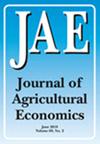Identifying the Collective Reputation Premium: A Spatial Discontinuity Approach
IF 4.2
2区 经济学
Q1 AGRICULTURAL ECONOMICS & POLICY
引用次数: 0
Abstract
In this work we propose a spatial discontinuity approach around the borders of wine appellation areas in Piedmont and Tuscany to solve the identification issue when measuring the impact of collective reputation on price. Using a database of geolocalised firms we show that collective reputation carries a significant price premium for well known appellations, whereas the effect is not significant or even surprisingly negative for weaker ones. We propose some possible explanations for such negative effect. These include the excessive proliferation of appellations, the different effectiveness of wine names, as well as group heterogeneity and the role of consortia.
识别集体声誉溢价:一个空间不连续的方法
在这项工作中,我们提出了一个围绕皮埃蒙特和托斯卡纳葡萄酒产区边界的空间不连续方法,以解决在测量集体声誉对价格的影响时的识别问题。利用地理定位公司的数据库,我们发现,对于知名的名称,集体声誉会带来显著的价格溢价,而对于较弱的名称,这种影响并不显著,甚至令人惊讶地为负。我们对这种负面影响提出了一些可能的解释。这些包括称谓的过度扩散,葡萄酒名称的不同有效性,以及群体异质性和财团的作用。
本文章由计算机程序翻译,如有差异,请以英文原文为准。
求助全文
约1分钟内获得全文
求助全文
来源期刊

Journal of Agricultural Economics
管理科学-农业经济与政策
CiteScore
7.90
自引率
2.90%
发文量
48
审稿时长
>24 weeks
期刊介绍:
Published on behalf of the Agricultural Economics Society, the Journal of Agricultural Economics is a leading international professional journal, providing a forum for research into agricultural economics and related disciplines such as statistics, marketing, business management, politics, history and sociology, and their application to issues in the agricultural, food, and related industries; rural communities, and the environment.
Each issue of the JAE contains articles, notes and book reviews as well as information relating to the Agricultural Economics Society. Published 3 times a year, it is received by members and institutional subscribers in 69 countries. With contributions from leading international scholars, the JAE is a leading citation for agricultural economics and policy. Published articles either deal with new developments in research and methods of analysis, or apply existing methods and techniques to new problems and situations which are of general interest to the Journal’s international readership.
 求助内容:
求助内容: 应助结果提醒方式:
应助结果提醒方式:


